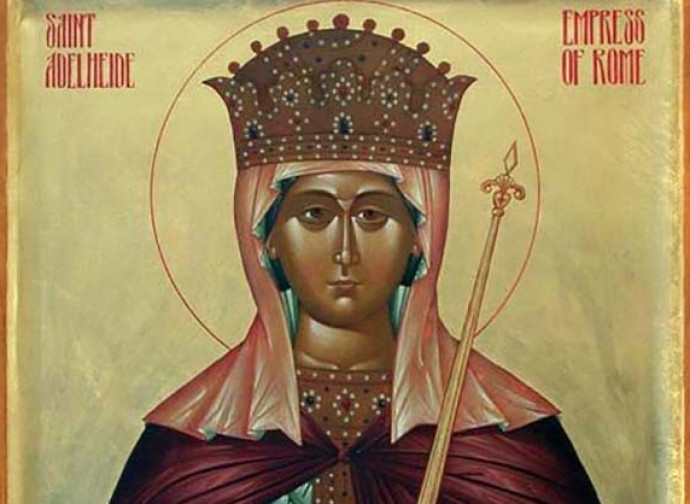Saint Adelaide
Queen, empress and, above all, saint: there were indeed many important milestones in the life of Adelaide of Burgundy (931-999), the common denominator was her reputation as an exemplary Christian, which she earned already in her youth.

Queen, empress and, above all, saint: there were indeed many important milestones in the life of Adelaide of Burgundy (931-999), the common denominator was her reputation as an exemplary Christian, which she earned already in her youth. She was a devoted mother and wife, influential in the politics of Italy and Germany, and particularly caring towards the destitute. Daughter of the king of Upper Burgundy, she lost her father when she was 6 years old. At 16 she was given in marriage to Lothair II and bore him a daughter. Her husband died three years later, perhaps poisoned by his rival Berengar II, who succeeded him as king of Italy, and asked Adelaide to marry his eldest son Adalbert: she refused and was imprisoned first in a castle and then in Rocca di Garda, where she was also subjected to food rationing. She managed to escape, perhaps with the help of Otto I of Saxony (912-973), who had come to Italy to free her and married her shortly afterwards.
On February 2nd 962, Adelaide accompanied her husband to Rome, where she was crowned empress by Pope John XII. On the death of Otto I, she was treated ungratefully by her son Otto II, and left the court. It was then that she turned to the abbot of Cluny, Saint Majolus, who helped the family to be reconciled. Otto II knelt to ask forgiveness from his mother, who gratefully sent offerings to the shrine of Saint Martin of Tours together with her son's cloak asking the Saint to protect him, with these words: "You, who had the glory of covering with your mantle Christ the Lord in the guise of a beggar". But Otto II died some years later: yet another bereavement for Adelaide, who survived five of her six children, and always offered her sufferings to God. In 991, on the death of her daughter-in-law Theophane, Adelaide found herself having to rule the Sacred Roman Empire because her nephew Otto III was still a child.
As the Regent of the Empire, Adelaide once again proved to be a wise leader, helped by the advice of of Saint Majolus and Saint Odilo of Cluny, whose reform movement she supported. She built churches, rebuilt the San Salvatore monastery in Pavia, founded the abbey of Seltz in Alsace and supported that of Payerne, Switzerland, while dedicating herself to several other works of charity. When her nephew came of age, she did everything in her power to bring peace to Burgundy; Saint Odilo would describe her journey in one of his works, Epitaphium, recalling Adelaide's devotion to the martyrs, her donations, as well as her miracles and prophecies. Towards the end of her life, Adelaide retired to the convent of Seltz, living a life of prayer and penance. She was canonized by Urban II in 1097.
